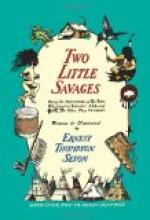Now Yan painted the uppers with his Indian paints in the pattern that Caleb had suggested, and the moccasins were done.
A squaw would have made half a dozen good pairs while Yan and Caleb made the one poor pair, but she would not have felt so happy about it.
XIV
Caleb’s Philosophy
The tracks of Mink appeared from time to time on Yan’s creekside mud albums, and at length another of these tireless watchers, placed at the Wakan Rock, reported to him that Mink as well as Skunks came there now for a nightly feast.
The Mink was a large one, judging by the marks, and Caleb was asked to help in trapping it.
“How do you trap Mink, Mr. Clark?” was the question.
“Don’t trap ’em at all this time o’ year, for they’re no good till October,” was the answer.
“Well, how do you trap them when they are in season?”
“Oh, different ways.”
It was slow work, but Yan kept on and at length got the old man going.
“Airly days we always used a deadfall for Mink. That’s made like this, with a bird or a Partridge head for bait. That kills him sure, sudden and merciful. Then if it’s cold weather he freezes and keeps O.K. till you come around to get him; but in warm weather lots o’ pelts are spoiled by being kept too long, so ye have to go round pretty often to save all you kill. Then some one brought in them new-fangled steel traps that catches them by the foot and holds them for days and days, some times, till they jest starve to death or chaw their foot off to get free. I mind once I ketched a Mink with only two legs left. He had been in a steel trap twice before and chawed off his leg to get away. Them traps save the trapper going round so often, but they’re expensive, and heavy to carry, and you have got to be awful hard-hearted before ye kin use ’em. I tell ye, when I thought of all the sufferin’ that Mink went through it settled me for steel traps. Since then, says I, if ye must trap, use a deadfall or a ketchalive, one or other; no manglin’ an’ tormentin’ for days. I tell ye that thar new Otter trap that grabs them in iron claws ought to be forbid by law; it ain’t human.
“Same way about huntin’. Huntin’s great sport, an’ it can’t be bad, ’cause I can’t for the life of me see that it makes men bad. ’Pears to me men as hunt is humaner than them as is above it; as for the cruelty—wall, we know that no wild animal dies easy abed. They all get killed soon or late, an’ if it’s any help to man to kill them I reckon he has as good a right to do it as Wolves an’ Wildcats. It don’t hurt any more—yes, a blame sight less—to be killed by a rifle ball than to be chawed by Wolves. The on’y thing I says is don’t do it cruel—an’ don’t wipe out the hull bunch. If ye never kill a thing that’s no harm to ye ‘live an’ no good to ye dead nor more than the country kin stand, ‘pears to me ye won’t do much harm, an’ ye’ll have a lot o’ real fun to think about afterward.




